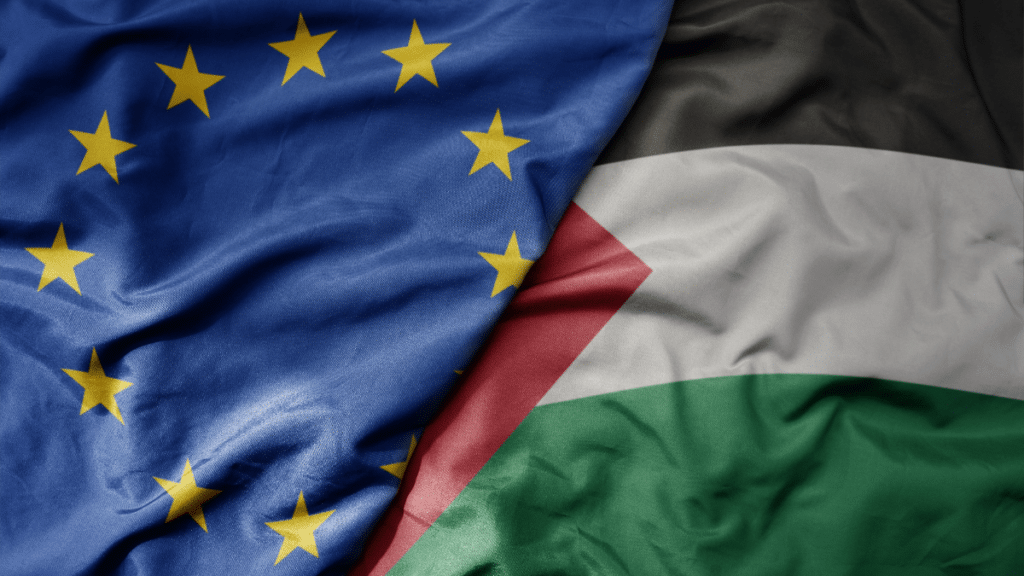The Digital Services Act and Palestinian Digital Rights: A Complex Intersection
Itxaso Domínguez de Olazábal / Nov 6, 2023Itxaso Domínguez de Olazábal is the EU Advocacy Officer at 7amleh – The Arab Center for the Advancement of Social Media, a non-profit organization dedicated to defending Palestinian digital rights.
Amid the much-anticipated implementation of the Digital Services Act (DSA) as a cornerstone in fortifying digital rights for European Union (EU) citizens, a significant concern arises. While the text is heralded as a positive step in addressing illegal and harmful content, there is growing apprehension about its unintended repercussions on the digital rights of Palestinians and other vulnerable communities, notably those in the Global South. 7amleh-The Arab Center for the Advancement of Social Media has vigilantly monitored this issue since the onset of negotiations around the DSA, emphasizing the intricate relationship between the Israel/Palestine context, the Global South as a whole, and EU legislation.
Unfortunately, as the invasion of Gaza and the violence against Palestinians everywhere else unfold our concerns have been validated. The current realities on the ground underscore the global and potentially adverse implications of the DSA for those already grappling with power imbalances. As part of the DSA Human Rights Alliance, we have consistently urged EU institutions to prioritize the risks confronting vulnerable or marginalized communities, both within and beyond the EU's borders. While initial concern about the DSA from civil society groups focused on the potential replication of laws empowering illiberal regimes, the dark side of the so-called ‘Brussels effect’, what we observe today is the DSA's adverse impact stemming from content moderation decisions that extend their influence far beyond the Union, affecting platform operations on a global scale.
A problematic framing that overlooks the violation of Palestinian human rights
One-sided statements relating to the current violence in Israel and Palestine indicate the DSA may be applied with bias. For instance, European Commissioner Thierry Breton recently emphasized the global impact of the DSA, albeit without explicit reference to Palestinians. He did so warning X, Meta and TikTok of their obligations under the text, as well as during a debate at the European Parliament on October 18th, 2023, titled 'Fighting Disinformation and the Spread of Illegal Content in the Context of the Digital Services Act during Times of Conflict.' The primary issue lies in Breton's and the EU's framing of the situation, which aligns closely with a biased mainstream narrative that too often neglects the Palestinian perspective and ongoing human rights violations by Israel.
These concerns were exacerbated during the parliamentary debate when Vice President of the Commission, Věra Jourová, referred to 'online platforms becoming a tool for terrorists and the spread of anti-Semitic and violent illegal content,' but did not mention how they may be used to incite violence against Palestinians. This narrow focus perpetuates a one-sided narrative that overlooks the complexities and nuances essential in understanding the situation's full scope, undermining efforts to address Palestinian human rights issues.
Discrimination of content advocating for Palestinian human rights: censorship, asymmetrical access to information and heightened risk of real-world harm to Palestinians
7amleh, in conjunction with other civil society organizations dedicated to upholding digital rights, has voiced concerns regarding Breton’s portrayal of the Commission's role in enforcing the text. The heart of civil society’s apprehensions primarily revolves around the prioritization of speed over due diligence in content removal. This approach has resulted in the unjust removal of legitimate content, breaching DSA provisions in a context where nuanced contextual understanding is crucial. The zeal to combat illegal content and disinformation at any cost has exerted significant pressure on Very Large Online Platforms (VLOPs), such as Facebook and TikTok, to act swiftly and decisively, even if it means relying on imperfect and opaque algorithmic tools to avoid liability and public scrutiny.
Unfortunately, this has led to the unjust and disproportionate removal of lawful content produced by Palestinian and foreign journalists, as well as human rights advocates documenting the on the ground reality. Consequently, this practice distorts vital information necessary for global understanding and monitoring of human rights abuses. Instead of adhering to the principle that any restriction on freedom of expression must be necessary and proportionate, online platforms have removed Palestinian-related content and suspended accounts, even some within the EU. What’s more concerning is that these decisions often manifest in the form of global takedown measures, leaving EU users without explanations for the content removal. These actions blatantly contravene DSA provisions that mandate prompt, diligent, non-arbitrary, and objective responses from platforms.
There is at least theoretical agreement among civil society organizations, online platforms, and legislators on the necessity of aligning interventions in the information space with international humanitarian and human rights law, particularly concerning the right to security. Incitement to violence against Palestinians from within the EU persists as a grave issue. Despite reporting content as illegal under the DSA, these actions have not resulted in satisfactory responses. Disinformation often accompanies violent speech against Palestinians in Gaza and the occupied territory. The selective pressure to remove only portions of inflammatory content leads to discrimination and harm against Palestinian individuals and communities. This is particularly concerning given that such content can incite real-life harm on Palestinians in the occupied territory and other marginalized communities across Europe.
Another worrisome aspect is the conflation in the DSA's treatment of illegal content and disinformation. The text establishes distinct regulatory approaches for these content types. VLOPs are tasked with assessing the risks their systems pose to society and taking actions to mitigate these risks, encompassing the need to address disinformation while also considering threats to freedom of expression. This balance is crucial for Palestinian digital rights. However, due to the problematic framing of the context mentioned earlier, there is a risk that the labeling of legitimate content as 'disinformation' may further suppress Palestinian narratives and accounts of the reality on the ground.
The problematic role of Internet Referral Units, compounded by a lack of transparency
A portion of content generated by Palestinians has been removed by online platforms in response to requests from Israel's Internet Referral Unit, commonly known as the "Cyber Unit." These removal requests have seen a high rate of acceptance, with Meta and TikTok responding affirmatively to 90% and 85% of these requests, respectively, according to one report. Importantly, VLOPs have also received takedown demands from EU law enforcement authorities, a situation that raises valid concerns about the potential involvement of law enforcement agencies as trusted flaggers. This intricate relationship is intrinsically connected to the substantial political pressures exerted on online platforms from various fronts.
This scenario, coupled with biased contextual framing and the prevailing power imbalances in the region, highlights the encroachment of EU agencies into the digital sphere. It paints a picture of the digital space evolving into a battleground where European governments seek to limit free expression. The motives driving content removal often remain ambiguous, owing to a troubling lack of transparency in these activities despite compliance requirements outlined by the DSA that emphasize the need for greater transparency and accountability. Furthermore, the policies implemented by online platforms frequently surpass the limitations allowed under international human rights standards, further contributing to the already prevalent over-enforcement of decisions against Palestinian and pro-Palestinian content.
Safeguarding Palestinian digital rights, upholding the spirit of the DSA and business & human rights principles
One of the fundamental goals of the DSA is to address the critical need to prioritize human rights considerations in the implementation of content moderation policies by VLOPs. We concur that the European Commission and other institutional stakeholders should rightly advocate for VLOPs to act vigilantly, especially during times of crisis. However, amidst the current disproportionate restrictions on fundamental rights, it's vital for those responsible to remember that the DSA clearly stipulates that these actions must be diligent, objective, and proportionate.
Transparency, due diligence, and an unwavering focus on human rights are indispensable in crisis situations to safeguard the rights of all users and rights holders, particularly those from vulnerable communities. Balancing the preservation of digital rights while regulating online content is an intricate task, especially when real-world harm may be imminent. Nevertheless, achieving the right balance is crucial to ensure justice for all. Given the DSA's provision of a more significant role for civil society actors compared to many other laws, it is crucial to engage with digital rights defenders beyond the EU, particularly in the Global South. We and many others are collectively interested in supporting EU institutions, provided that their idea of a ‘predictable and trusted online environment’ is one in which a non-discriminatory and human rights-centered approach remains the guiding principle.
Authors

